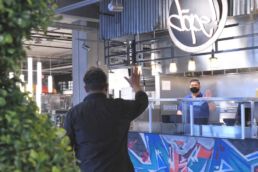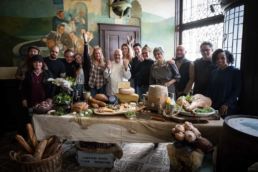words GRACE YEK, CCC, MS | photography SYBIL VILLANUEVA
Things You Didn’t Know You Didn’t Know About Food
Few things are as deliciously inevitable as Simon Majumdar’s entrée into podcasting. After all, a man whose food knowledge is as extensive as the Encyclopedia Britannica has more to say than simply judge the next celebrity chef.
With the launch of “Eat My Globe: Things You Didn’t Know You Didn’t Know About Food,” Majumdar will add “podcaster” to his already long, illustrious list of accomplishments. In case you haven’t kept up, they include the role of recurring judge on Food Network, sought-after speaker, author of three books chronicling his encounters with food, and most recently, food critic for Time Out Los Angeles.
The podcast title is a nod to his first book, Eat My Globe, in which he chronicled his encounters with food as he traveled the world. Published in 2010, the book shot him to stardom, landing him the role of judge in Iron Chef America.
On the cusp of his podcast launch, Majumdar talks to Polly Magazine about his new venture.
 Q: Congratulations on your podcast. What is it about?
Q: Congratulations on your podcast. What is it about?
A: It is a food history podcast. Each episode will look at a dish such as fish and chips, an ingredient like SPAM, a drink such as gin or a theme such as the last meals on the Titanic—and go back to examine not only the history of the subject itself, but also the events in history that made it possible. I am producing it with my wife, Sybil, my friend, April Simpson, who is an experienced editor and content creator. I am also working on each episode with the Department of History at UCLA, who will be fact-checking and commenting on each episode.
Q: What is the format? For example, will you have guests on your podcast?
A: Each episode will be approximately 45 minutes long. In Season #1, there won’t be any guests, it will more be a narration from me. However, I am already researching Season #2 and plan to have interview guests on some of those episodes.
Q: How many podcast episodes do you have lined up?
A: Season #1 will be comprised of seven episodes. Season #2 should be around the same.
Q: Please tell me more.
A: The podcast will launch on October 1. It will be available on all podcast subscribers. There will be a membership element soon, with special episodes and access to live events.
Q: Is there anything else your listeners might like to know about the podcast?
A: Primarily that I would like this to be interactive. I would love to hear from people, if they agree or disagree with my views, and if they have any subjects they would like us to cover.
Q: What inspired you to start this new endeavor? Why now?

A: I have always been fascinated by food history; not just in the origins of dishes, but in the way that food can impact our culture and vice versa. People don’t know that our first stock exchanges were created because of spices, or that fish and chips, a quintessentially British dish is the result of religious persecution in France and Portugal. There are also amazing people who have been relegated to the footnote of history, but without whom, our diets would be a lot less interesting. For example, Nicolas Appert who invented canning and created the bouillon cube, Mary the Jewess who was famed for her knowledge in distillation and after whom the bain-marie is named, and Robert Fortune who carried out the greatest feat of culinary espionage of all time. I hope the podcast will bring out some of these fun stories.
Q: In the broader context, how does this podcast relate to the books you’ve authored and other gastronomic encounters you’ve written about?
A: This doesn’t really relate to my books, which are all food and travel memoirs. Although the name is the same as my freshman effort, just because I like the name. However, I also write a monthly newsletter and the features in there on food history have proved so popular, they prompted me to think that there might be a market for this podcast.
Q: What’s been the hardest thing about the podcast? How have you dealt with it?
A: The research has been very time consuming, if a great deal of fun. But, perhaps the hardest part is trying to achieve a balance between something that is historically accurate but remains accessible and not like listening to a lecture.
Q: You seem excited about this project. What excites you about it?
A: I think creating, hopefully, good content is always exciting. And, if it is on a subject about which one is passionate, that makes it even more so. I always love telling these stories, so to be able to share them with a wider audience is genuinely thrilling. I am also hopeful that it might create more opportunities for me to talk about food history in other formats.
 Q: Has the podcast changed you in any way? Please elaborate.
Q: Has the podcast changed you in any way? Please elaborate.
A: I would not say that it has changed me, but I do think that it has reminded me how much I like the notion of study. So, to be able to spend days pouring over books has been liberating. I exist in a world (television) that can often be rather glib, so to spend time on a project that is more elevated is a joy.
Q: What do you hope your listeners will get out of your podcast?
A: I have to admit that my main motivation has been to treat the podcasts in a selfish way, as an end in themselves, the study being as important as the release. However, I really hope that people do enjoy them and come back for more.
Q: Is there anything else you would like to add?
A: Just to remind people to subscribe to the podcast and give us a thumbs up if they are enjoying what we produce.
* The interview has been edited for length and clarity.
Eat My Globe: Things You Didn’t Know You Didn’t Know About Food
Podcast launch date: October 1, 2018
Website: https://www.eatmyglobe.com/
Twitter: @EatMyGlobePCast
Facebook: @EatMyGlobeOfficial
Instagram: @eatmyglobe
Grace Yek is the food editor at Polly Magazine. She is a certified chef-de-cuisine with the American Culinary Federation and a former chemical engineer. Questions or comments? Connect with her on graceyek.com.



